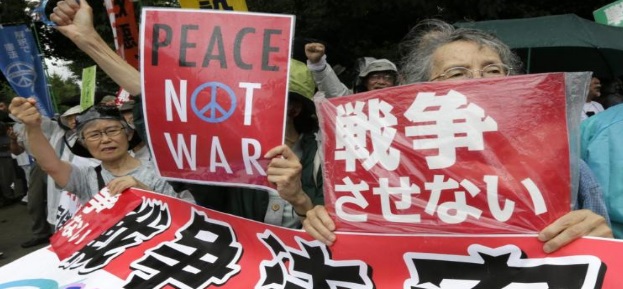LEXIE TUCKER WRITES – Since the end of World War II, Japan has successfully avoided war as a way to settle international conflicts. The country’s constitution intentionally promotes peace by de-emphasizing its military.
That may no longer work.
Early Saturday morning, September 19, the upper house of Japan’s parliament passed controversial security bills that would allow the country’s Self-Defense Forces to engage overseas. The changes include permitting Japanese forces to practice collective self-defense or aid an ally, even if Japan itself is not directly threatened.
Not everyone was thrilled by this turn of events. According to The Guardian, chaos broke out on September 17 after “Japan’s ruling party pushed contentious security bills through a legislative committee, catching the opposition by surprise and causing chaos in the chamber.” Members from the opposition party got so shook up that they dashed towards the chairman’s seat, requiring the ruling party legislators guard his podium.
In addition, there have been mass protests by the Japanese public. The day before the bill was passed, tens of thousands of people rallied on their way to the Diet building holding signs with simple sentiments such as “Peace Not War.” Similar rallies were also held in Sapporo, Nagoya, and Osaka.
Many of the nation’s legal scholars say the bills violate the terms set forth in their Constitution. In an interview with The Guardian, Seiichi Takahashi, a 33-year-old doctoral student, stated that the ruling party has been avoiding direct conversations regarding the bills and is disregarding the Constitution. Protesting for three days straight, Takashi said that, “If such a thing is permitted, the government can just act as it likes.” Yukiko Take, a 28-year-old master’s degree student, echoed Takahashi’s beliefs: “I find it problematic to forcibly go ahead even though a lot of people say the bills are unconstitutional.”
In a democratic country, the government is supposed to act on the desires of its people. After what happened in the world of journalism back in May, Japan’s track record isn’t looking so good right now.
https://www.youtube.com/watch?v=wPDxLyJTlyc

